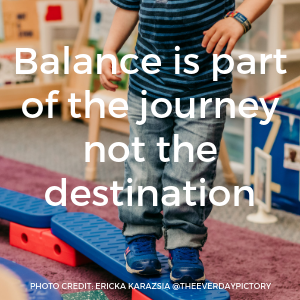 In our work with children, we talk about the importance of intentionally teaching and supporting their self-regulation skills.
In our work with children, we talk about the importance of intentionally teaching and supporting their self-regulation skills.
But what about the self-regulation of adults?
What role does self-regulation play in our lives? And what extent does our ability to self-regulate, ensure our success and happiness?
Without going into great detail, it’s pretty clear from the research, that self-regulation plays a major role in our lives and our ability to support children’s development and learning.
In fact, for me, self-regulation (e.g., the ability to set clear boundaries and manage change) comprises a fifth of our overall emotional intelligence.
Self-regulation is our ability to adapt and manage change; ability to understand the best response for the situation; and ability to control emotional reactions in order to respond in productive and authentic ways.
Despite its importance, there’s a bit of a problem with how we think about self-regulation across the life span.
The problem is that when we think of the phrase “self-regulation“, we often think it translates into our ability to consciously choose to take things in stride, respond appropriately to all situations, and to purposefully use our “Yes brain” versus our “No brain”.
In other words…we think we’re in control of the degree to which we show up in the world emotionally well-balanced.
When in fact, we often don’t have conscious control over our thoughts, actions, and emotions, and we can be quite unaware of the triggers that cause us to “flip our lid”. Blink…and we can find ourselves upset, anxious, and frustrated.
When our goal is balance (aka a common definition of self-regulation), we will continue to fall short.
Because as my friend Petra Kolber, author of The Perfection Detox, reminds us, “Balance is an illusion.”
Instead of seeking a zen like state – where we are “regulated”…the goal is to increase our emotional intelligence. The goal is to find ways to stop, think, and then act.
One strategy I use is something I learned from another friend, Dr. Tererai Trent author of The Awakened Woman. She teaches that to become more self-regulated, we need to be more aware of what she refers to as our “little hungers”.
Little hungers are things that consume our thoughts and tend to drive our emotions. They are things we can give a great deal of attention to…but in the long run, aren’t the things that bring us success, happiness, or a sense of well-being.
Check out this excerpt from a talk I gave with Dr. Tererai Trent at The Hivery’s Entrepreneur + Inspiration Lab. In the video, I share more about my three “little hungers” and how I avoid their traps as I strive to be more self-regulated.
Resources:
- My EQ Quiz for ECE Leaders [link]
- Resources for teaching children self-regulation skills:
- Pre-K Teach and Play Self-Regulation Toolkit [link]
- Self-Regulation Assessment Rubric and DDDM [link]
- Pre-K Teach and Play podcast – Stop, Think, Act: Promoting Self-regulation In Young Children [link]
- Pre-K Teach and Play podcast – Are You Teaching Coping or Mechanism Strategies? Why the Difference Matters to Children’s Emotional Well-Being [launches 7-18-19]
- The Perfection Detox by Petra Kolber [link]
- If you are interested in learning more about the little hungers, check out this podcast episode with Tererai on incredible perseverance [link]
- Video credit: The Hivery